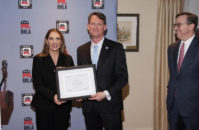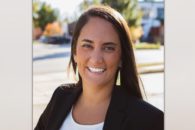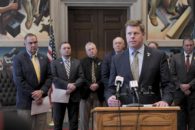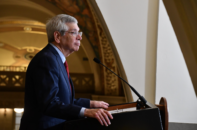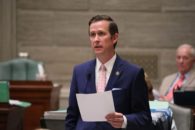JEFFERSON CITY, Mo. — After passing a massive licensing reform bill in 2020, Rep. Derek Grier continued his push for licensing reform this session.
Grier’s HB 476 began with language expanding Missouri’s licensing reciprocity laws to cover licenses issued by the military but grew to include broader licensure reforms as it progressed through the General Assembly. It was truly agreed to and finally passed in the House last week with no opposition.
Grier said the underlying bill was inspired by conversations with veterans and members of the armed forces who faced difficulty seeking work after their service.
“It can often be very challenging for them to find jobs after they come out of the military, and one of the specific reasons for that was their specialty training isn’t always recognized or they have to do a lot of duplicative training,” Grier told The Missouri Times. “We passed the most comprehensive regulatory reform in the country last year so we thought it would make sense to recognize the training from the military if it correlates to a professional license.”
The final version of the bill includes a myriad of provisions, covering everything from pesticide dealers’ licenses to occupational therapists, dieticians, and architects.
Grier has become a nationally recognized expert on licensing reciprocity: His HB 2046, which was signed into law last year, allowed individuals who hold professional licenses in other states or Washington, D.C., to acquire an equal license in Missouri for certain jobs.
The bill also established the Fresh Start Act and Expanded Workforce Act, which bans occupational licensing boards from denying licenses based on criminal history with the exception of violent or sexual crimes or crimes directly related to the licensed profession.
Grier spoke with legislators across the country and appeared on a White House call about licensing reform last year, putting four years of research to use and demonstrating his knowledge on a national scale.
“Breaking down barriers to work is my No. 1 priority in the legislature,” he said. “We set an example across the entire country for how to do things and other states are now following suit. If you talk to our Department of Professional Registration, they will tell you it’s already having a massive impact. There are hundreds of people already impacted, and there will be thousands more in the future.”
He noted licensure is a complex subject to tackle. He began an attempt to bring Missouri into line with other states’ policies on sign language interpreters — who are required to be licensed in Missouri but not in other states. He said the community opposed the change, leading him to direct his efforts elsewhere.
With massive reform legislation on his resume, Grier said the work was far from over.
“I think there’s still a lot of work to be done with getting rid of some of the protectionist strategies that are designed to make it difficult for competitors to enter the workplace. The more we can do to break down those barriers, the more we can focus on the purpose of a professional license,” he said. “Missouri is making tremendous progress. We’re setting the example for the rest of the country and I look forward to continuing to push those reforms forward.”

Cameron Gerber studied journalism at Lincoln University. Prior to Lincoln, he earned an associate’s degree from State Fair Community College. Cameron is a native of Eldon, Missouri.
Contact Cameron at cameron@themissouritimes.com.
















